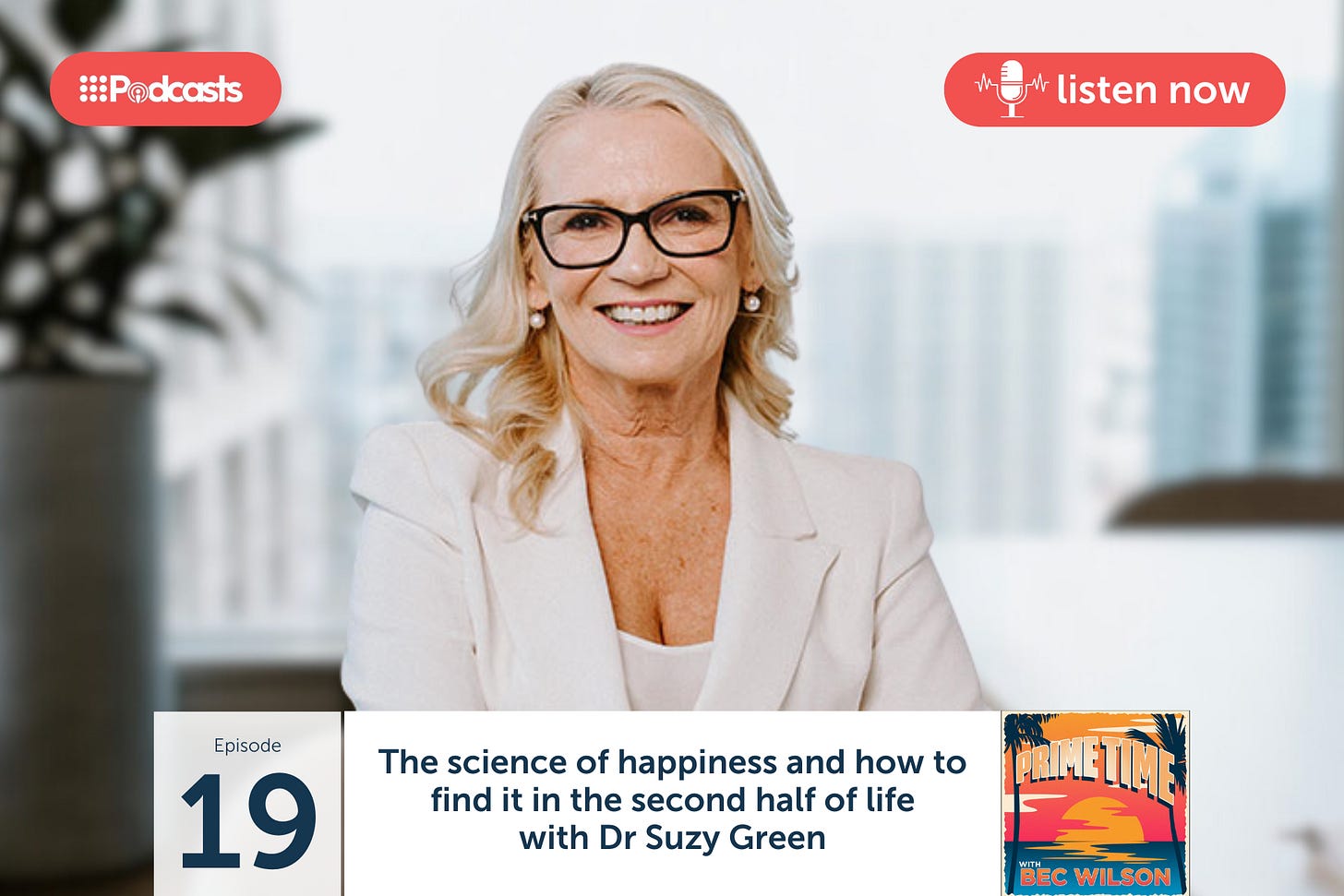Planning for your ‘tipping point’ before retirement
The very definition of retirement is tied to the concept of work, the dislike of it, and the idea that we all want to give it up and head off to ‘enjoy life’. But that's just not the case anymore.
It’s been a short week! So there was no newsletter midweek, and just a quick one today to bring you today’s column in The Sydney Morning Herald, The Age, Brisbane Times, and WA Today - because sometimes I need a little break too!
But we’re back into things this week, with a film crew coming for updates to the Epic Retirement 6 Week Flagship Course. I can’t wait. The next course event is almost ready to launch - just waiting until we’ve consolidated all the feedback from our first series so we improve everything in one go! You can fill out our expression of interest form for the next release of the course, so you get the Earlybird offer as soon as it is released. Earlybirds will be limited this time. And the feedback so far is blowing me away. 🥰
“Really enjoying the course” and “Found this week very thought provoking”.
“Loving the course. I was a little hesitant to sign up but I am so glad I did. It is worth every penny. I may have to revisit some sections to gain solidify the learning in the financial sections though.” and
“Loving the course so far, getting a lot out of it - thank you!”
This week on the Prime Time podcast we dove into happiness and fulfilment, with Dr Suzy Green the Founder and CEO of The Positivity Institute. Our chat reinforced a lot of what you read in How to have an Epic Retirement, and went deeper too. More on this below.
Have a lovely Sunday! Make it epic!
Many thanks! Bec Wilson
Author, podcast host, columnist, retirement educator, and guest speaker
The very definition of retirement is tied to the concept of work, the dislike of it, and the idea that we all want to give it up at some point and head off to enjoy life. But as life expectancy increases, many are rejecting this all-or-nothing concept. We’re finding that work and the enjoyment of life don’t have to be mutually exclusive.
Most Baby Boomers today have seen about 15 years added to their lifespan during their lifetime. Gen Xers will see more. The average 60-year-old in 1954 lived to a life expectancy of about 71 years old. A 60-year-old today is expected to live beyond the age of 85 for men and 88 for women.
More than 50 per cent of Boomers will live longer. It’s driving a massive change to what we can do in the middle and later years of our lives that used to only be reserved for the process of growing old.
There are no expectations for the second half of life other than the idea that one day you’ll retire. But I debate the need to “retire” as early as we are. I think we all need to take a hard look at how we could have the best of both worlds – embracing this as the prime time of our lives, where we can work at our choice of pace, travel, enjoy life and really dig into our relationships in a way we’ve never had time to.
Nicki Bean wrote to me this week: “I’m 62 and retired two years ago. Despite being really active, travelling lots and trying to fill my life with meaning, I feel like I should never have given up working. I feel like I’ve lost my whole sense of purpose.”
These letters fill my inbox most weeks as people try to reconcile the old definition of retirement, with their new longer lives and their hunger to remain fulfilled.
As life expectancies expand and superannuation grows, it’s worth understanding your choices.
Modern work plays an exciting role in many peoples’ lives. And, with the shortage of workers, and the flexibility that workplaces are embracing, working longer looks possible. That changes how we shape our finances, and frankly, our futures.
We’re raised by the financial services industry to plan for our ultimate retirements and we should. But there’s an even more important point that we should really understand, and that’s the point where we can move into the phase where we choose what we do with our time. I call it our “tipping point”. It can come a long way before true retirement.
To grasp your tipping point, you need to understand your cost of living and lifestyle and costs of the one-off expenses and experiences you want to build into your life, ideally annualised for the “good years”. Then you need to work through the income sources and become more literate about how they work in the second half of life. Here’s how I think about them:
Consider your income streams in phases. Take time to explore how much income you will be able to generate from passive and non-passive sources and contemplate how these change over the years ahead.
A good way to do this is to map your years ahead into phases and list the income available in each. Consider how much work income you want to generate per annum in each phase.
Then contemplate the other layers of income that will be available to support you, based on your access to superannuation, the age pension and income from investments outside super. It helps you see what’s possible.
Really understand how superannuation works. After you’ve built your budget and assessed your income needs, you should run the projections to work out how your phases time into your access to superannuation.
It helps to become more familiar with the superannuation system, as it is much more flexible than people give it credit for. Consider that you can retire from full-time employment at any time after the age of 60, or what is known as preservation age, move up to $1.9 million of your superannuation into retirement phase and commence an account-based pension that is entirely tax-free.
Then you can return to working full-time, part-time or casual without penalty, leveraging your ability to make compulsory employer contributions to super all your life and concessional contributions up to the age of 75. Or you can keep working and access your super unconditionally from 65 too.
Know how the pension plays into your picture. The Australian age pension system is a great safety net, and if understood well can become a layer of your retirement income that kicks in typically at the age of 67, when you may want to take a step back from the workplace.
It’s important to really understand how the pension fits into your wider financial picture, and how it layers with your superannuation and work income at different ages and stages of life.
Decide whether to spend or save into full retirement. People are often surprised when I point out that in preparing for their pre-retirement years and, later, their retirement, those with healthy but not enormous superannuation balances might want to consider two completely opposing strategies and weigh up their standard of living in each. A financial adviser can help you with this.
One approach is to spend harder on lifestyle earlier in your life, using a portion of your hard-earned savings and relying on more of the age pension once eligible. The other is to carefully preserve your capital with the goal of having a completely self-funded income stream, or at the very least, looking only to access the age pension very late in life.
Not everyone will be able to chase their tipping point before retirement, but as life expectancies expand and superannuation grows, it’s worth understanding your choices.
This article was first published in The Age, The Sydney Morning Herald, Brisbane Times and WA Today.
What is happiness? What does it mean to be happy, and how do we know if we are genuinely happy or satisfied with our lives, particularly as we transition through midlife and approach the stages of pre-retirement and retirement? This period often marks significant changes, prompting a need for a deeper understanding of happiness and where to find it. So this week we went looking for that deeper understanding of happiness and fulfilment.
In this episode, I had the pleasure of chatting with Dr. Suzy Green, the founder and CEO of The Positivity Institute. Dr. Green, an expert in happiness, is a university researcher, psychologist, author, and speaker.
We talked all about the different types of happiness, exploring practical ways you can seek out more happiness and joy. And we discussed the challenges of transitions, and a powerful framework for getting through the tough times.









